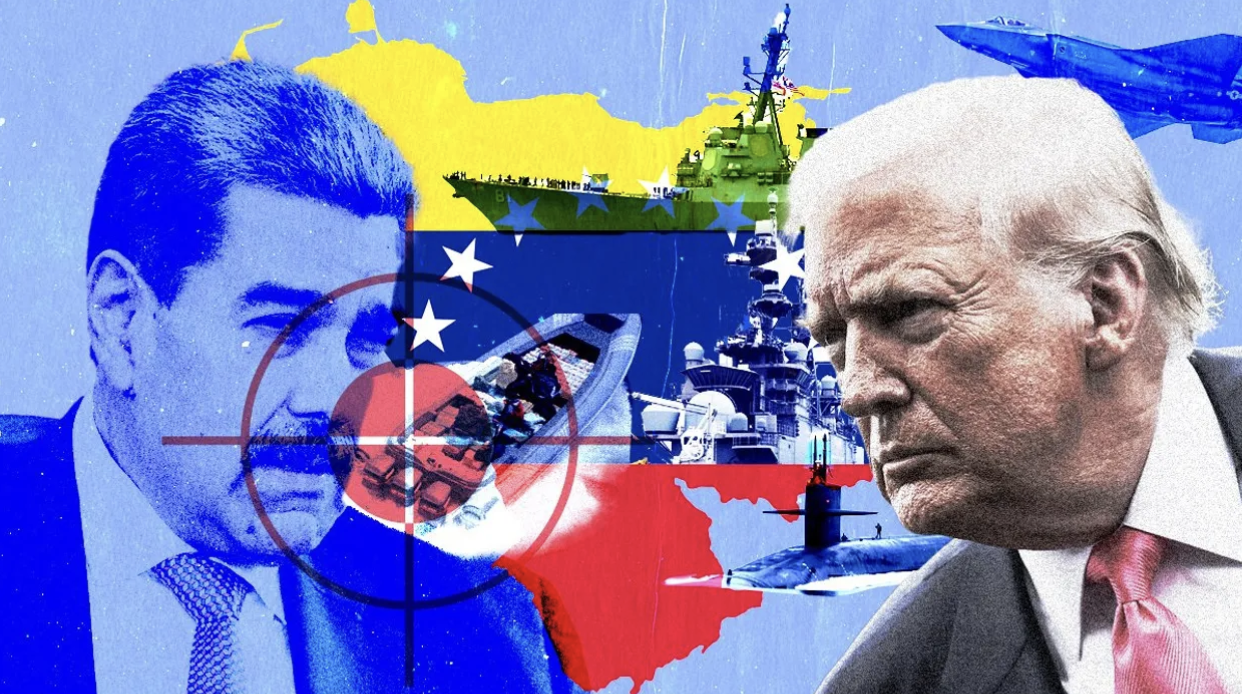Image via Jeff Frampton GZero Media
***
The already fragile relationship between Venezuela and the U.S. has reached new, unnerving tensions, from what has long been a tense but largely rhetorical standoff has accelerated toward potential military confrontation, with the Trump administration positioning U.S. forces for potential strikes against the Maduro government. Despite President Trump asserting that he has “sort of” made up his mind, senior defense officials have spent days in high-level deliberations. Military assets, including special operations units and carrier-based aircraft, have also been quietly moved into the Caribbean to prepare for further instructions. Thus, this has deepened uncertainty about U.S. intentions towards Venezuela and what the next phases of this already tense mutual tolerance will look like.
As people wait anxiously to see what will unfold between the two nations, many ask themselves what has led President Trump to make this decision. At the center of this escalation lies an expansive legal justification that interprets Venezuela’s alleged partnerships with narcotics traffickers and criminal networks as a direct threat to U.S. national security. Many lawmakers and legal experts are worried as well, stating that under international law, harboring drug runners has never been considered a use of force or an attack, leaving the U.S. with no legal justification under international law to strike against Venezuela. Neighboring Latin American countries have also expressed their disconcertment, with countries like Colombia distancing themselves from U.S. intelligence-sharing and Mexico voicing objections to strikes near its territory.
With a U.S. aircraft carrier and 15,000 personnel deployed in the Caribbean, the question arises regarding Trump’s primary goal behind this military action. Trump has openly expressed his intentions behind this, as extended efforts to increase pressure for Maduro to step down. Along with military action as pressure, Secretary of State Marco Rubio announced that the State Department would designate a Venezuelan group, Cartel de Los Soles, as a foreign terrorist organization. This designation restricts financial transactions of the group or anyone associated with it. Evidently, Trump is looking to put pressure on Venezuela on all fronts, in hopes that Maduro will be left with no choice but to give in and step down. What worries many, however, is how far the U.S. is willing to push.
Since the start of Trump’s second term, the U.S. has expanded its pressure tactics—doubling the reward for Maduro’s capture, and launching “Operation Southern Spear” against alleged drug-trafficking vessels. These actions, which have already resulted in more than 80 deaths, have drawn scrutiny from legal experts who question both the strikes’ legitimacy and their strategic value, fueling speculation that the growing U.S. military presence in the Caribbean may signal broader ambitions, such as gaining control of Venezuela’s oil reserves rather than simply unseating Maduro. While Trump alternates between dismissing the likelihood of war and refusing to rule out ground troops, Maduro has responded with direct appeals to the American public and a stated willingness to engage in face-to-face talks. Meanwhile, opposition leader María Corina Machado continues urging the Venezuelan military to abandon the regime, underscoring a turbulent political landscape in which both domestic and international pressures are converging at a critical moment for Venezuela’s future.
As Washington intensifies its pressure campaign and Caracas signals a conditional openness to dialogue, U.S.—Venezuela relations stand at a precarious crossroads with regional stability hanging in the balance. The convergence of escalating military actions, along with legal justifications, and deepening political fractures within Venezuela has created a moment of profound uncertainty. Whether this crisis moves toward negotiation or confrontation will depend not only on the decisions made in Washington and Caracas but also on the willingness of both presidents and international institutions to constrain escalation and support a peaceful resolution. Ultimately, the path chosen in the coming weeks may shape the geopolitical landscape of the Western Hemisphere for years to come.
***
This article was edited by Anna Gehres and Cameron Ma.
